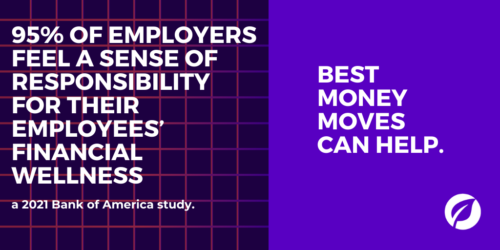4 reasons to care about employee financial wellbeing. Thanks to the pandemic, employee financial wellbeing is a huge point of focus for many workforces. Here’s why that should matter to your team.
According to a 2021 Bank of America study, 95% of employers feel a sense of responsibility for their employees’ financial wellness. Indeed, employee financial wellness is the new normal for organizations — and for good reason. Financial stress has far reaching effects far beyond an employee’s wallet, impacting everything from productivity, to mental health and even retention.
Here are 4 reasons why financial wellbeing is a must-have in your employee benefits package.

1. Financial stress lowers employee productivity.
More than 60% of employees say that their financial stress has increased since the onset of the COVID-19 pandemic, according to a PwC survey. And that financial distress can easily seep into an employee’s work life and disrupt job performance.
In the same PwC survey, employees whose financial stress increased due to the pandemic were four times more likely to admit that finances are a distraction at work. And over time, long-term stress can lead to health issues, burnout and potential resignations.
Investing in financial wellness benefits can support employees’ overall wellness and help them focus while at work. More than 80% of employers agreed that financial wellness programs lead to greater employee engagement and productivity.
2. Focusing on financial wellbeing and financial wellness can promote retention and attract new talent.
Financial stress, burnout and other COVID-19 related factors have contributed to widespread resignations at a higher-than-usual rate, also known as “the Great Resignation.” Offering financial wellness benefits is a way to support existing and future employees during this uncertain time — and employees recognize this as well.
Employees have shown a preference for companies who are invested in their financial wellbeing. A PwC study showed that most employees would consider leaving their current employer, if they came across another that cares more about their financial wellbeing.
Again, financial wellbeing impacts much more than just employees’ pockets — it impacts health, stability and security, too. So, making financial wellness an integral part of overall wellness can go a long way with both future and existing employees.
3. Financial wellbeing is tied employee mental health more than you think.
COVID-19 has made both employees and employers reconsider their approach to mental health. In addressing employee wellbeing and providing support, employers must take a comprehensive approach and consider financial wellbeing, as well.
Money reaches all aspects of life — family, home, work and personal health — and it has a huge effect on overall wellbeing. Financial stress and its effects do not function in a silo. In fact, a third of employees said their mental health negatively affected their job performance in 2021, per an Aflac report.
Whether worrying about bills or retirement, financial stress can cause depression and anxiety, especially amid long-term uncertainty like a pandemic. Half of American employees have high anxiety about health care costs beyond what their insurance covers. And more than a quarter of the U.S. workforce currently describes itself as “depressed,” says a Gartner HR survey.
The more support employers can offer, the better, and a tangible form of support is financial wellness benefits. It can foster employee satisfaction and improve wellbeing.
4. Employees need more financial benefits than retirement and student loan assistance
Financial wellness is an all-encompassing benefit that applies to all employees in some way. Not everyone has the same financial goals, especially within a multigenerational workforce. Financial wellness takes a more personalized approach, it allows employees to address the financial goals and stress that matters most to them.
Older employees may not be attracted to student loan benefits, whereas some millennials may not utilize retirement plans. Over 80% of employees want personal finance benefits and guidance beyond typical retirement plans and safety net insurance. This mismatch in offered benefits and employee needs often causes offered benefits to go used.
Instead, by offering financial wellness programs, like Best Money Moves, employers can help employees manage their personal finance goals and stress.
Best Money Moves is a mobile-first platform that offers personalized financial planning and coaching resources, focused on solving your employees’ pain point. The program uses artificial intelligence, along with a human-centered design, to measure employee financial stress and then dial it down with personalized solutions. Our triggers and alerts system — as well as budgeting tools, personal finance resources and more — help guide employees to make more informed financial decisions and reduce their overall stress.
To learn more about Best Money Moves Financial Wellness Platform, let’s schedule a call. Contact us and we’ll reach out to you soon.





